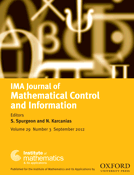
IMA JOURNAL OF MATHEMATICAL CONTROL AND INFORMATION
Scope & Guideline
Pioneering Research in Mathematical Theory and Applications.
Introduction
Aims and Scopes
- Mathematical Control Theory:
The journal covers a wide range of topics within mathematical control theory, including stability, controllability, and optimal control of dynamic systems. It emphasizes both linear and nonlinear systems, providing a rigorous mathematical framework for analyzing and designing control strategies. - Information Systems and Data Processing:
Research related to the integration of information systems with control theory is a key focus. This includes studies on observer design, state estimation, and fault diagnosis within the context of control systems, highlighting the importance of data in effective system management. - Application of Advanced Mathematical Techniques:
The journal promotes the use of advanced mathematical techniques such as differential equations, stochastic processes, and fractional calculus in control theory. This includes exploring novel approaches to solve complex control problems and improve system robustness. - Multi-Agent Systems and Networked Control:
A significant area of interest is the control of multi-agent systems, including consensus protocols and cooperative control strategies. This reflects the growing relevance of networked systems in modern applications, such as autonomous vehicles and smart grids. - Interdisciplinary Applications:
The journal encourages research that applies mathematical control principles to various fields, including engineering, economics, and biology. This interdisciplinary approach fosters the development of innovative solutions to real-world problems.
Trending and Emerging
- Adaptive and Robust Control Strategies:
There is a growing emphasis on adaptive and robust control techniques that can handle uncertainties and variations in system dynamics. This trend reflects the increasing complexity of real-world systems that require flexible and resilient control solutions. - Stochastic and Hybrid Systems:
Research on stochastic systems and hybrid control strategies is on the rise, particularly those that integrate elements of randomness and time delays. This trend is crucial for applications in fields such as finance, robotics, and networked systems, where uncertainty is a significant factor. - Integration of Machine Learning with Control Systems:
The intersection of machine learning and control systems is emerging as a prominent theme. Researchers are exploring how machine learning techniques can enhance control strategies, improve system performance, and enable more intelligent decision-making processes. - Nonlinear and Fractional Order Systems:
There is an increasing interest in the control of nonlinear and fractional-order systems. This reflects a broader trend in the field towards addressing the complexities of real-world systems that cannot be adequately modeled by traditional integer-order linear equations. - Networked Control Systems and Distributed Algorithms:
The study of networked control systems, particularly those employing distributed algorithms for consensus and coordination among agents, is gaining traction. This is particularly relevant in the context of the Internet of Things (IoT) and autonomous systems, where communication and collaboration are essential.
Declining or Waning
- Traditional Linear Control Techniques:
There has been a noticeable decrease in publications focusing solely on traditional linear control methods. As the field evolves, researchers are increasingly exploring more complex nonlinear and adaptive control strategies, leading to a reduced emphasis on classical linear approaches. - Basic Stability Analysis:
The frequency of papers centered on basic stability analysis of linear systems has waned. This shift may be due to the growing sophistication in stability analysis techniques, such as those incorporating stochastic elements or time delays, which are now more prevalent. - Static Optimization Problems:
Research focused on static optimization problems, particularly in isolation from dynamic systems, has diminished. The trend is shifting towards dynamic optimization problems that consider time-varying parameters and constraints, reflecting a more comprehensive understanding of real-world systems.
Similar Journals
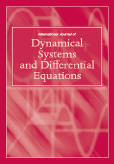
International Journal of Dynamical Systems and Differential Equations
Connecting Theories with Real-World ApplicationsThe International Journal of Dynamical Systems and Differential Equations, published by INDERSCIENCE ENTERPRISES LTD, is an esteemed academic journal that focuses on the intricate mathematical theories and applications of dynamical systems and differential equations. Established in the United Kingdom, this journal plays a critical role in advancing research within its scope, which includes control optimization, discrete mathematics, and engineering. Despite its recent rankings indicating a Q4 status in Control and Optimization and Discrete Mathematics, along with a Q3 position in Engineering, the journal provides a vital platform for scholars to disseminate their findings and engage with ongoing debates in these fields. Researchers and students alike benefit from the journal's commitment to fostering innovative ideas and methodologies, contributing to the development of mathematical sciences. Although currently not an open-access publication, the journal's archives from 2007 to 2023 include valuable research articles that continue to influence the landscape of mathematical explorations.
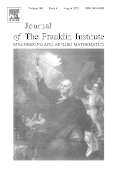
JOURNAL OF THE FRANKLIN INSTITUTE-ENGINEERING AND APPLIED MATHEMATICS
Fostering a legacy of excellence in academic research.JOURNAL OF THE FRANKLIN INSTITUTE-ENGINEERING AND APPLIED MATHEMATICS, published by Pergamon-Elsevier Science Ltd, stands as a premier platform for disseminating cutting-edge research in the fields of applied mathematics, computer networks and communications, control and systems engineering, and signal processing. Established in 1826, this esteemed journal carries a rich heritage of scholarly contributions and continues to be influential, evident in its 2023 recognition as a Q1 journal across multiple research categories. With its commitment to advancing knowledge and innovation, the journal invites researchers, professionals, and students to engage with a diverse array of rigorous studies designed to push the boundaries of engineering and applied mathematics. Although open access options are currently unavailable, the journal maintains a robust publication standard, ensuring that each article undergoes a meticulous peer-review process. By contributing to the JOURNAL OF THE FRANKLIN INSTITUTE, authors can enhance their visibility and impact within the global academic community, solidifying the journal’s role as a cornerstone of research and development.

Control Theory and Technology
Pioneering Research in Control Technology and ApplicationsControl Theory and Technology, an esteemed journal published by SPRINGER MEDIZIN VERLAG GmBH, serves as a vital platform for the dissemination of cutting-edge research in the fields of control theory, systems engineering, and optimization. With an ISSN of 2095-6983 and E-ISSN of 2198-0942, this journal, which has been operational since 2014, reflects a strong commitment to advancing knowledge within various disciplines, including Aerospace Engineering and Signal Processing, as indicated by its impressive 2023 Scopus rankings and quartile placements. Positioned in Q2 and Q3 categories across multiple engineering and mathematical disciplines, the journal promotes rigorous peer-reviewed articles that explore innovative applications and theoretical developments. Although it does not offer open access, the quality and relevance of the content presented make it an essential resource for researchers, professionals, and students seeking to deepen their understanding and contribute to the rapidly evolving landscape of control technology.

JOURNAL OF DYNAMICAL AND CONTROL SYSTEMS
Fostering Insights for Academics and Industry ExpertsJOURNAL OF DYNAMICAL AND CONTROL SYSTEMS is a premier interdisciplinary journal published by Springer/Plenum Publishers, recognized for its significant contributions to the fields of dynamical systems, control theory, and numerical analysis. With an ISSN of 1079-2724 and an E-ISSN of 1573-8698, the journal serves as an important platform for researchers and professionals to share their findings and innovative methodologies. Covering topics from algebra and number theory to control and optimization, it holds a respectable position in the 2023 Q2 quartile rankings across various categories, reflecting its impact and quality within the academic community. The journal’s scope is expansive, aiming to foster advancements and insights that are instrumental for academics and industry experts alike. With a convergence period from 1995 to 2024, the journal continues to be a vital resource for students, researchers, and professionals seeking to navigate the complexities of control systems and their dynamic interactions. For those looking to contribute to the ongoing discourse in these critical areas of study, the JOURNAL OF DYNAMICAL AND CONTROL SYSTEMS remains a highly recommended choice.

Nonlinear Analysis-Modelling and Control
Catalyzing knowledge and fostering innovation in mathematics.Nonlinear Analysis-Modelling and Control is a leading open-access journal published by the Vilnius University, Institute of Mathematics and Informatics, nestled in the heart of Lithuania. Since its inception in 2009, the journal has been committed to advancing the field of nonlinear analysis through rigorous research and comprehensive modelling techniques. With an impressive Q2 category ranking in both Analysis and Applied Mathematics for 2023, it stands out with its strong academic influence reflected in its Scopus ranking, where it is positioned in the top 12% percentile for Mathematics - Analysis and the top 24% for Mathematics - Applied Mathematics. This journal not only serves as a platform for pioneering research but also emphasizes interdisciplinary collaboration in addressing complex mathematical and control problems. Its open-access policy since 2017 ensures that its findings are readily accessible to a global audience, fostering knowledge dissemination and innovation across the mathematical community. Researchers, professionals, and students will find Nonlinear Analysis-Modelling and Control an essential resource for the latest developments and applications in nonlinear systems.
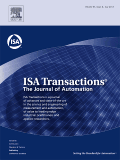
ISA TRANSACTIONS
Pioneering Insights for Tomorrow's Technological ChallengesISA TRANSACTIONS, published by Elsevier Science Inc, is a premier academic journal that serves as a vital platform for advancing knowledge in the fields of Applied Mathematics, Computer Science Applications, Control and Systems Engineering, Electrical and Electronic Engineering, and Instrumentation. With an impressive H-index reflecting its scholarly impact, the journal is recognized in the top quartile (Q1) across its categories as of 2023, showcasing its significance within these disciplines. The journal boasts a robust Scopus ranking, placing it amongst the top journals globally—ranked #16 in Applied Mathematics and #6 in Instrumentation—highlighting its influence and reputation. ISA TRANSACTIONS not only contributes to theoretical advances but also addresses practical applications in engineering and technology, making it essential reading for researchers, professionals, and students seeking to stay at the forefront of innovation. Published continuously since 1968, it promises to remain a cornerstone for future research until at least 2024, fostering academic discourse and collaboration in a rapidly evolving technical landscape.

Journal of Applied Mathematics and Computing
Transforming Ideas into Computational SolutionsThe Journal of Applied Mathematics and Computing, published by SPRINGER HEIDELBERG, is a premier open-access journal dedicated to the advancements and interdisciplinary applications of mathematical theory and computing techniques. Since its inception in 1997, this journal has become a vital resource for researchers and practitioners, contributing significantly to the fields of Applied Mathematics and Computational Mathematics, currently positioned in the Q2 category as per the 2023 metrics. With an impressive Scopus ranking of #130 out of 635 in Applied Mathematics and #48 out of 189 in Computational Mathematics, it reflects a robust academic influence and a dedication to high-quality research dissemination. The journal's accessibility as an open-access resource since 2002 ensures that its groundbreaking findings are available to a global audience, fostering collaboration and innovation in the mathematical sciences. Based in Heidelberg, Germany, the journal continues to invite contributions that push the boundaries of both theory and practical applications, making it an essential platform for scholars, professionals, and students alike.
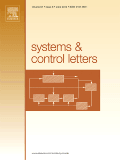
SYSTEMS & CONTROL LETTERS
Innovative Insights for Modern Engineering PracticesSYSTEMS & CONTROL LETTERS is a prestigious journal published by ELSEVIER, dedicated to the advancement of knowledge in the fields of Systems and Control Engineering. With an ISSN of 0167-6911 and E-ISSN 1872-7956, this journal has become a cornerstone for academics and professionals alike, featured in the top quartile (Q1) categories for Computer Science (miscellaneous), Control and Systems Engineering, Electrical and Electronic Engineering, and Mechanical Engineering as of 2023. The journal encompasses a broad scope of interdisciplinary research and technological advancements, providing a forum for innovative ideas that can shape modern engineering practices. Despite being a subscription-based journal, its impact is underscored by significant Scopus rankings, with a notable placement in the 70th percentile for General Computer Science and consistent recognition across multiple engineering disciplines. With origins dating back to 1981 and converging through to 2024, SYSTEMS & CONTROL LETTERS continues to serve as an essential resource for researchers seeking to publish high-quality research, thereby fostering collaboration and knowledge dissemination within the engineering community.

Differential Equations and Dynamical Systems
Challenging Paradigms, Inspiring InquiryDifferential Equations and Dynamical Systems is a prominent academic journal published by Springer India, dedicated to the fields of analysis and applied mathematics. With an ISSN of 0971-3514 and an E-ISSN of 0974-6870, this journal serves as a platform for scholars to disseminate innovative research on differential equations and their applications in various dynamical systems. Recognized within the Q3 category for both Analysis and Applied Mathematics, it ranks impressively in Scopus, highlighting its contribution to the advancement of mathematical sciences. The journal aims to foster interdisciplinary research and provide an inclusive forum for researchers, professionals, and students engaged in this vital area of study. Although not open access, it offers valuable insights and findings published from 2008 to 2024, reinforcing its importance as a resource for ongoing developments in mathematical analysis. As a reputable source in its field, it invites contributions that challenge existing paradigms and inspire further inquiry.

International Journal of Dynamics and Control
Fostering Excellence in Dynamic Systems EngineeringInternational Journal of Dynamics and Control, published by SPRINGERNATURE, is a prestigious academic journal aimed at advancing the fields of Civil and Structural Engineering, Control and Optimization, Electrical, Electronic, and Mechanical Engineering, as well as Modeling and Simulation. With an ISSN of 2195-268X and an E-ISSN of 2195-2698, this journal focuses on high-quality research that addresses complex dynamic systems and control methodologies essential for innovation and progress in engineering disciplines. The journal has achieved significant recognition, being ranked in the second quartile for multiple categories in 2023, which underscores its impact and relevance within the academic community. Although it operates under subscription access, its rigorous peer-review process ensures that published articles meet the highest standards of scientific excellence. Researchers, professionals, and students alike will find valuable insights and methodologies that inform their work and inspire future studies in dynamic systems and controls.